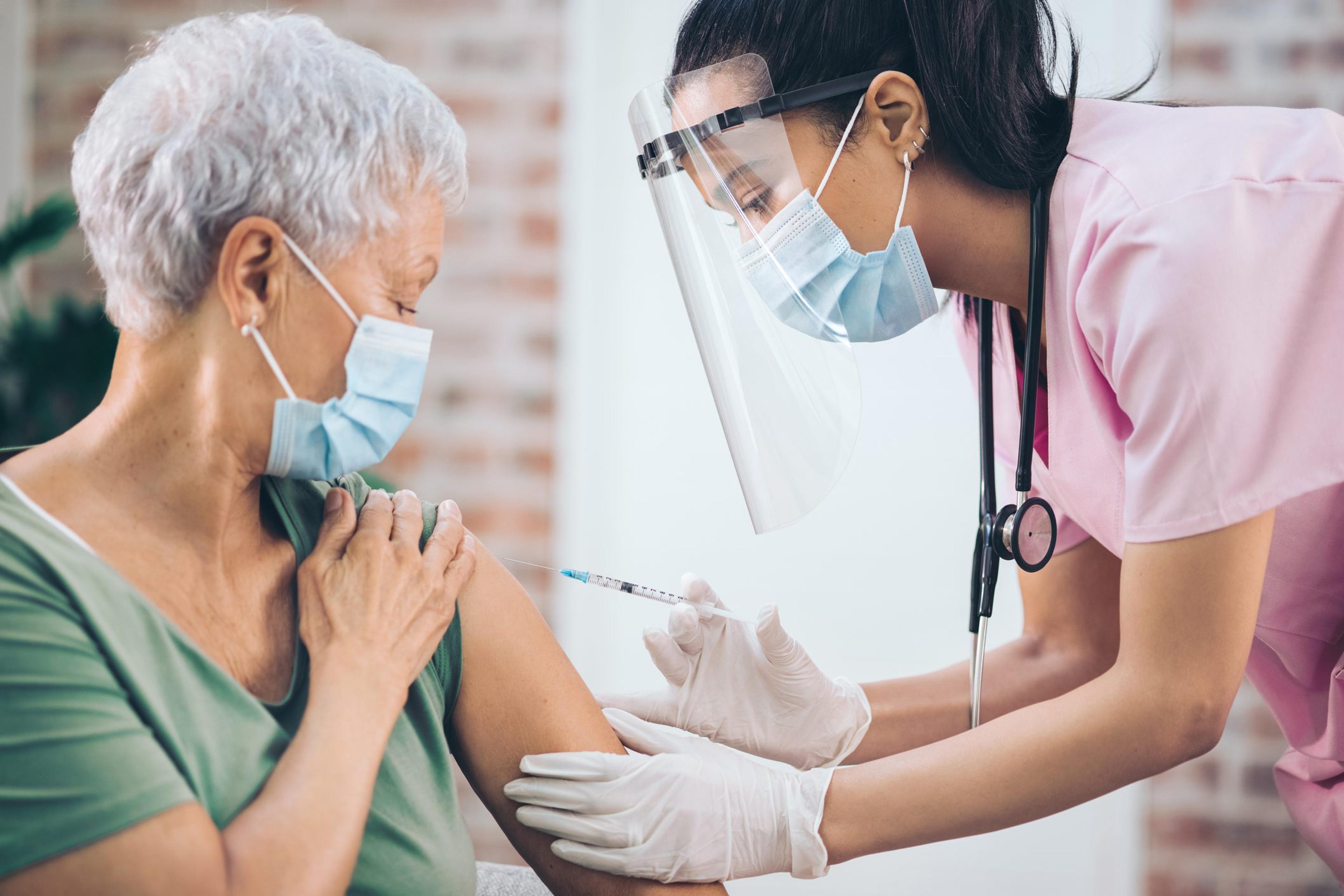COVID Booster Shot: Frequently Asked Questions

Dr. James Grant
| 5 min read
James D. Grant, M.D. is senior vice president and ch...

This article was updated Jan. 14, 2022, with the latest information from federal health officials. Vaccination against the coronavirus is the best way to prevent you and others from getting severely ill with COVID-19. But if you’re at a higher risk for getting sick from COVID – either because of your age, job status, living arrangements or health conditions – you may need a booster shot to ensure your body’s ability to protect you from the virus remains strong. Here are some frequently asked questions about COVID-19 booster shots:
QUESTION: WHY IS A BOOSTER SHOT FOR COVID NEEDED?
Answer: COVID-19 vaccines are highly effective at preventing severe illness, hospitalization and death. However, over time, the amount of protection vaccinated people have against the virus – especially among certain groups of people like older individuals and those who are immunocompromised – can start to decrease. Booster shots can help those individuals maintain protection against the disease.
Q: WHICH COVID-19 BOOSTER SHOT IS AVAILABLE?
A: The COVID vaccines made by Pfizer, Moderna and Johnson & Johnson have received emergency use authorization from the U.S. Food and Drug Administration for booster doses.
Q: WHO CAN GET THE COVID BOOSTER SHOT?
A: The CDC advise everyone age 12 and older is eligible for a booster dose. Recommendations vary depending on the type of vaccine you received in your initial vaccination series. Here are the CDC's recommendations:
- For individuals who received a Pfizer vaccine, the CDC advises you may get a booster dose if you are age 18 and older, and at least five months after completing your initial vaccination series. Teens age 12 to 17 years old may only receive a Pfizer booster dose.
- For individuals who received a Moderna vaccine, the CDC advises you should get a booster dose if you are age 18 and older, and at least five months after completing your initial vaccination series.
- For individuals who received a Johnson & Johnson vaccine, the CDC advises you should get a booster dose if you are age 18 and older. Booster doses are recommended at least two months after your initial vaccination dose.
If you have an underlying medical condition or take medication that affects your body’s immune system, talk to your health care provider about whether the booster shot is right for you.
Q: WHERE CAN I GET THE COVID BOOSTER SHOT?
A: COVID-19 vaccine booster doses are typically available in the same location that you would find the initial dose of the COVID vaccine – pharmacies, urgent cares, doctor’s offices and hospitals. Here are some ways to find a booster dose near you:
- Search vaccines.gov
- Text your ZIP code to 438829
- Call 1-800-232-0233
- Check with your local pharmacy to see if walk-ins or appointments are available for a booster shot
- Check with your county or state health department for more information
Q: ARE THERE SIDE EFFECTS TO THE BOOSTER SHOT?
A: Side effects to the Pfizer booster shot reported so far are similar to the side effects from the initial two-dose series, according to the CDC. Most side effects were mild to moderate, and typically included fatigue and pain at the injection site. In rare cases, serious side effects may occur. The CDC is soon expected to release more information about the side effects of the Moderna and Johnson & Johnson booster shots.
Q: IS THE BOOSTER SHOT THE SAME AS THE FIRST TWO DOSES?
A: It depends on which brand of vaccine you receive. The booster doses of the Pfizer vaccine and the Johnson & Johnson vaccine are the same amount that were administered as a part of the initial vaccination round. The third “booster dose” of the Moderna vaccine is half of the dose of one of the initial shots in the two-dose vaccination regimen.
Q: Do I have to get the same vaccine brand for the booster that I got for my initial immunization?
A: No. While the CDC recommends individuals receive the same brand of vaccine for their booster dose as their original vaccination series, the CDC and FDA advise individuals can choose which brand of booster shot they get. For example, someone who received a Johnson & Johnson vaccine could receive a booster shot made by Pfizer or Moderna. However, it’s important that during the initial vaccination, individuals should receive the same vaccine for the two-dose Pfizer and two-dose Moderna series. Additionally, immunocompromised individuals should not be mixing vaccines. Check with your primary care provider when considering a “mix and match” strategy for vaccines.
Q: If I can’t get a booster shot yet, what should I do?
A: Understandably, there may be individuals who are at a higher risk of getting COVID-19 who may not yet be able to get a booster shot. In these cases, it’s important to continue to follow good pandemic protocol when out in public: wear a mask, wash your hands often and stay home if you’re sick.
Q: Do I still need to wear a mask and practice other precautions, even after I get a booster shot?
A: Yes, it’s still important to follow best practices for preventing the spread of the coronavirus including wearing a mask in public, social distancing when necessary, frequently washing your hands and staying home if you’re sick – regardless of your vaccination status. The pandemic is not over yet, and as new and more contagious variants emerge, staying vigilant is the best way to protect yourself and others from the virus. James D. Grant, M.D., is chief medical officer at Blue Cross Blue Shield of Michigan. More from MIBluesPerspectives:
- Answering Your Questions: The COVID-19 Vaccine for Kids Ages 5 -11
- The Difference Between COVID-19 and the Flu
- What to Do When You’ve Lost Your COVID Vaccine Card
Photo credit: Getty Images





